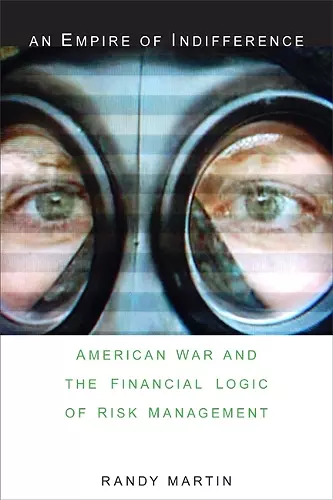An Empire of Indifference
American War and the Financial Logic of Risk Management
Format:Paperback
Publisher:Duke University Press
Published:14th Mar '07
Currently unavailable, and unfortunately no date known when it will be back

Analyzes imperial ambitions in the context of the dominance of finance, not simply as a form of capital, but also as a set of protocols for organizing daily life
Presents a Marxist critique of contemporary American imperialism. This book argues that a finance-based logic of risk control has come to dominate Americans' everyday lives as well as US foreign and domestic policy.In this significant Marxist critique of contemporary American imperialism, the cultural theorist Randy Martin argues that a finance-based logic of risk control has come to dominate Americans’ everyday lives as well as U.S. foreign and domestic policy. Risk management—the ability to adjust for risk and to leverage it for financial gain—is the key to personal finance as well as the defining element of the massive global market in financial derivatives. The United States wages its amorphous war on terror by leveraging particular interventions (such as Iraq) to much larger ends (winning the war on terror) and by deploying small numbers of troops and targeted weaponry to achieve broad effects. Both in global financial markets and on far-flung battlegrounds, the multiplier effects are difficult to foresee or control.
Drawing on theorists including Michel Foucault, Giorgio Agamben, Michael Hardt, Antonio Negri, and Achille Mbembe, Martin illuminates a frightening financial logic that must be understood in order to be countered. Martin maintains that finance divides the world between those able to avail themselves of wealth opportunities through risk taking (investors) and those who cannot do so, who are considered “at risk.” He contends that modern-day American imperialism differs from previous models of imperialism, in which the occupiers engaged with the occupied to “civilize” them, siphon off wealth, or both. American imperialism, by contrast, is an empire of indifference: a massive flight from engagement. The United States urges an embrace of risk and self-management on the occupied and then ignores or dispossesses those who cannot make the grade.
“An Empire of Indifference is a brilliant study, both theoretically profound and politically compelling.”— Michael J. Shapiro, author of Methods and Nations: Cultural Governance and the Indigenous Subject
“An Empire of Indifference is the perfect answer to Thomas Friedman’s The World Is Flat. Randy Martin well understands that finance capital flattens and gouges at the same time. This book is the anti-Friedman.”—Neil Smith, author of The Endgame of Globalization
“While a great deal has been written about globalization, empire, and international finance, I know of no other work besides this one that looks at their intersection through the rhetorical and conceptual lens of finance. An Empire of Indifference is a strong piece of original scholarship on a very important topic.”—Chris Hables Gray, author of Peace, War, and Computers
ISBN: 9780822339960
Dimensions: unknown
Weight: 308g
232 pages